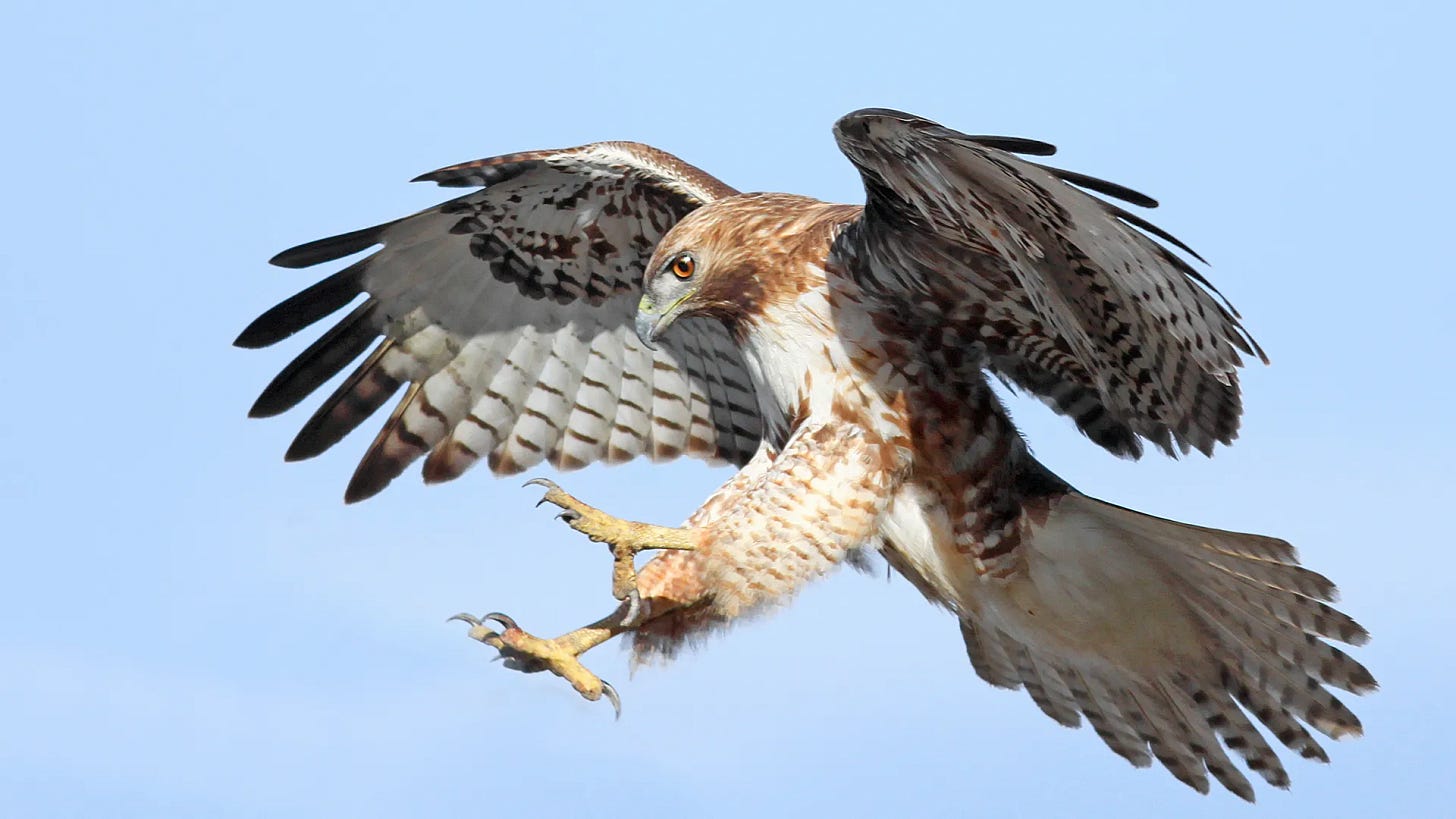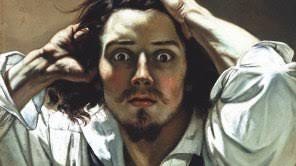
My wife, Lun*na Menoh, wakes up every morning at 5 AM to sit in her studio, facing the North, to watch the sunrise. Our view includes the Number Five Freeway, the Glendale Number Two Freeway, and the rooftops of Atwater Village. Two gas stations are across the street from each other, and a couple of homeless encampments are under the Five Freeway. On almost a daily basis, a Red-Tailed Hawk sits on the electrical tower to watch the sunrise with my wife. It sometimes comes during the early afternoon to sit on the tower, but primarily hoovers over our house to look for rodents and giant insects to eat.
Lun*na is obsessed with the painter Gustav Courbet. Walking around her studio, you will see photographs/images of Courbet on her walls and various books on or focusing on some aspect of Courbet and his paintings. Over the past two years, the main conversation at our home has been on Courbet. I have not read anything about this artist, but I know him intimately through Lun*na’s eyes and mind. When she saw the Hawk a year ago, she immediately called him (why that gender is a mystery) Gustov. A morning doesn’t go by without the mention of Gustov the Hawk; in turn, Gustove, the artist, will be mentioned by the afternoon. We don’t have pets, so Gustov the Hawk is very much a living object that is close to our family. It is not unusual for Gustov to look at us through our window as we look at him. Lun*na feels he comes by to give his regards, especially at sunrise.
When I take my walks, and as I focus on the pavement and sidewalk on a cloudless sunny day, a shadow shaped like a Hawk comes by over my head. I think of images of Batman, seeing his cape-span or presence on darkened walls with the image of half Bat-creature and Bat-human. Or the pulp antihero The Shadow, who leaves no presence except for a shadow that terrorizes his enemies. I feel Gustov is protecting our home, but me as well, as I walk down my street, mostly lost in thought, but Gustov reminds me that I’m not alone here.
Our home has large windows, and I do my writing in front of them, where I can see the sky and the treetops. Gustov is a common sight while I write, and I either see him ride on the air current or as a passing shadow among the trees and our next-door neighbor’s wall. I’m not a believer in God, but I believe Gustov is responsible for looking over us as we do our work at home.
Several species of Hawks live in Gaza, including the Levant Sparrowhawk, Eurasian Sparrowhawk, and Steppe Buzzard, among others. Of course, the surroundings during an invasion are affected. Bombings and infrastructure damage reduce nesting sites and the area where they usually hunt for food, which is more likely destroyed. The violent changes also make it harder for them to find food because their “food” either moved or was killed as well. Like the citizens of Gaza facing hunger, the Hawk also has to deal with food shortages. Also, the sounds of war can be stressful to the Hawks, which causes them to miss their migration time or routes. And, of course, like the rest of the world, pollution caused by war, as well as by industries, can cause trauma for the Hawk community.
Living in the twenty-first century has been stressful, and besides reading and enjoying art, seeing Gustov hoovering over me is a sign of comfort for my troubled soul. May Gustov keep on flying so I can soar.
















Re Courbet. Earlier this year I read Communal Luxury by Kristin Ross a study of the Paris Commune of 1871 with particular attention to the Artists Federation of which Courbet was elected president. He helped draft the Federation's manifesto:
The artists of Paris, in adhering to the principles of the Communal Republic, have formed a federation.
This uniting of all the artistic intellects has as its bases:
The free expansion of art, free from all governmental supervision and from all privileges.
Equality of rights among all the members of the federation.
The independence and dignity of every artist taken under the protection of all through the creation of a committee elected by the universal suffrage of artists.
Monuments, from the artistic point of view, museums and Paris establishments containing galleries, collections, and libraries of works of art not belonging to private individuals, are entrusted to the keeping and the administrative supervision of the committee. [Famously Courbet authorized the destruction of the Vendome Column, for which he paid dearly after the Commune was suppressed.]
It will erect them, preserve them, and adjust them, and it will complete plans, inventories, indexes and catalogues.
It will place these at the disposal of the public in order to encourage studies and satisfy the curiosity of visitors.
It will note the state of preservation of buildings, indicate urgent repairs, and present the Commune with a frequent account of its works.
After examination of their capacity and inquiry into their morality, it will appoint administrators, a secretary, archivists and wardens, in order to assure the service needs of these establishments and for exhibitions, which will be spoken of later.
beautiful story Tosh, curious how does Lun*na react, to me criminal defacement of GCs work L’Origine du Monde, not a brilliant work but still to call it a feminist statement? this world is troubling as you say, we have socially accepted criminals to deal with and the avoidance of nature.